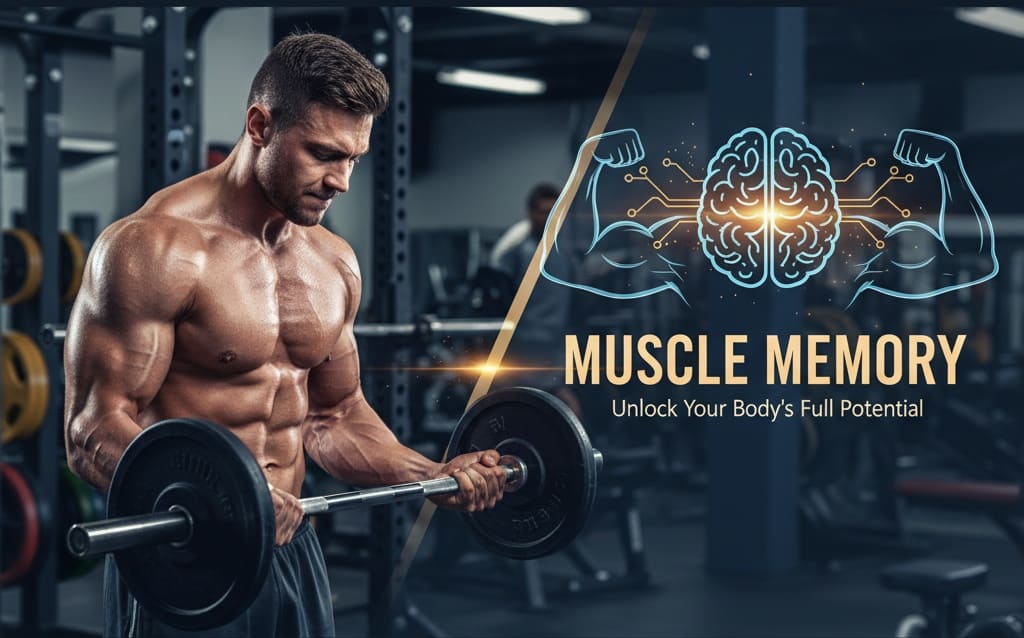Muscle Memory For Bodybuilding – What Is It? How Does It Work? 2025

Muscle memory in bodybuilding is a fascinating phenomenon where your muscles “remember” their previous size and strength, allowing you to regain them faster after a break. This article explains what muscle memory is, how it works on a biological level, and how bodybuilders can take advantage of it to bounce back from training gaps. We’ll also bust some myths, dive into strategies to maximize it, and answer common questions to clear up confusion once and for all.
Disclaimer: This article is for educational purposes only and should not replace professional medical or fitness advice. Always consult with a certified trainer or healthcare professional before making drastic changes to your training or diet.
Ever taken a few months off from the gym and worried you’d lose all your gains? Then, when you finally get back under the barbell, you’re shocked at how quickly your strength and size return. That’s not magic, it’s muscle memory at work.
In bodybuilding, muscle memory is like your body’s built-in “save file” for strength and muscle. It’s the reason why experienced lifters can rebound faster than beginners. But what exactly is happening inside your body? And how can you use it to your advantage? Let’s break it down.
Read More: How to do Dumbbell High Pull, Benefits, Precautions
What Exactly Is Muscle Memory?
When we say “muscle memory,” most people think of skills like riding a bike or typing on a keyboard. That’s one version of muscle memory neuromuscular coordination. But in bodybuilding, muscle memory goes deeper.
In this context, muscle memory refers to your muscles’ ability to regain lost size and strength much faster than it took to build them initially. For example, if you bulked up over two years and then lost muscle after six months off, you’ll likely rebuild that size in just a fraction of the time once you return to training.
So, muscle memory isn’t about your brain remembering exercise; it’s your muscles holding onto a blueprint of their past growth.
The Science Behind Muscle Memory
Let’s geek out a little. Why do your muscles “remember” their past state? There are three main biological factors:
1. Muscle Cell Nuclei Retention
Muscle fibers are unique because they’re multinucleated (meaning they have multiple nuclei). When you train and build muscle, you increase the number of these nuclei through a process involving satellite cells. Even if you stop training and your muscles shrink, those nuclei remain.
Think of them like empty houses. When you start training again, those houses are ready to be “furnished” with new muscle protein, allowing rapid regrowth.
2. Epigenetic Changes
Training alters gene expression in your muscles. Certain genes stay “primed” even after long layoffs, which means when you lift again, your body activates growth signals faster. It’s like leaving sticky notes on your DNA saying, “We’ve done this before, let’s do it again!”
3. Neural Adaptations
Your nervous system also plays a role. When you first learn to squat, deadlift, or bench press, your nervous system gets more efficient at firing motor units. Even if you lose strength during time off, your nervous system doesn’t completely forget. This makes it easier to lift heavier again compared to when you were a beginner.
Why Muscle Memory Is a Game-Changer for Bodybuilders
If you’re into bodybuilding, muscle memory is your safety net. Here’s why it matters:
- Less Fear of Taking Breaks: Life happens, injuries, work, vacations. Knowing you can bounce back quickly reduces stress.
- Faster Rebuilding: You won’t be stuck in beginner mode forever. Gains come back faster.
- Confidence Booster: The mental edge of knowing your body can “snap back” helps you stay motivated.
- Long-Term Progress: Even with ups and downs, consistent effort over the years adds up thanks to muscle memory.
How Long Does It Take to Lose Muscle?
This is a question every bodybuilder asks. The truth? It depends.
- After 2–3 weeks of no training, you may notice a slight decrease in muscle size (mostly from glycogen and water loss, not actual tissue).
- After 4–6 weeks: Strength begins to decline, but nuclei remain intact.
- After 3+ months: Noticeable muscle atrophy happens, but the “memory” remains strong.
The silver lining: no matter how long you take off, you’ll likely regain faster than it took you to build originally.
How Fast Can You Rebuild Lost Muscle With Muscle Memory?
Most people regain lost muscle within a few months of consistent training. For example, if you built 10 pounds of muscle over a year, then lost it during a break, you might regain it in just 2–3 months once you’re back in the gym.
It’s like muscle growth is a slow uphill climb the first time, but a downhill jog when you return.
Factors That Influence Muscle Memory
Not everyone rebounds the same way. Here are key factors:
- Training History – The longer you’ve trained, the stronger your muscle memory.
- Age – Younger athletes may bounce back faster, but older lifters still benefit.
- Nutrition – Adequate protein, carbs, and calories speed up recovery.
- Rest & Recovery – Sleep and stress management amplify muscle regrowth.
- Consistency – You can’t rely on memory; training still matters.
How To Use Muscle Memory To Your Advantage
Knowing muscle memory exists is one thing. Using it smartly is another. Here’s how to make it work for you:
1. Ease Back Into Training
Don’t try to lift your old PRs on day one. Instead, start at 50–70% of your previous loads and gradually progress. Your muscles remember, but your joints and tendons need time to catch up.
2. Focus on Compound Movements
Squats, deadlifts, bench presses, and rows stimulate more muscle fibers and reactivate those nuclei faster.
3. Keep Nutrition On Point
Fuel your body with protein (1.6–2.2g/kg body weight), carbs for energy, and healthy fats for hormone support. Muscle memory works best when your body has the raw materials to rebuild.
4. Prioritize Recovery
Muscles grow when you rest, not when you train. Aim for 7–9 hours of sleep and manage stress to optimize hormone balance.
5. Stay Patient
Muscle memory accelerates progress, but it’s not instant. Think weeks and months, not days.
Myths About Muscle Memory
There’s a lot of misinformation floating around. Let’s set the record straight:
- Myth 1: Muscle memory means you’ll never lose gains.: False. You can lose muscle, but regaining it is faster.
- Myth 2: Muscle memory only lasts a few weeks.: Nope. Research shows nuclei can stick around for years.
- Myth 3: Supplements create muscle memory.: Supplements can help recovery, but they don’t create the effect. Training does.
- Myth 4: Beginners have the same muscle memory as advanced lifters.: Not quite. Muscle memory is stronger in those with more training history.
Real-Life Examples of Muscle Memory
Think about pro athletes who retire, lose size, then come back in shape within months. Or maybe you’ve seen your gym buddy take a year off and then regain size shockingly fast. That’s not steroids or magic, it’s biology.
Even average gym-goers experience this. Someone who trained consistently in their 20s and stopped may still benefit from muscle memory decades later when they pick up the weights again.
FAQs About Muscle Memory in Bodybuilding
1. Does muscle memory work after years of no training?
Yes! Studies suggest muscle nuclei can last for many years, so even if you’ve been away for a long time, you’ll likely rebuild faster.
2. Can beginners use muscle memory?
Technically, no muscle memory comes from prior training. Beginners don’t have past gains to “remember.”
3. Is muscle memory permanent?
The nuclei you gain seem to last indefinitely, which gives you a long-term advantage.
4. Do steroids affect muscle memory?
Yes, anabolic steroids can enhance muscle nuclei, which might give an even bigger memory effect. However, this comes with health risks.
5. Does cardio affect muscle memory?
Cardio won’t erase muscle memory, but excessive cardio without strength training may slow regrowth.
6. Can older adults benefit from muscle memory?
Absolutely. Even seniors who trained earlier in life often regain muscle faster than first-time lifters.
7. How long until I see results after coming back to the gym?
Most people notice changes within 4–6 weeks, with significant regrowth by 3 months.
Conclusion
Muscle memory is like a secret weapon in bodybuilding. It ensures that all the sweat, reps, and years you put into building muscle don’t vanish completely when life forces you to take a break. Thanks to retained muscle nuclei, epigenetic changes, and neural adaptations, your body keeps a record of its past strength and size.
So, the next time you feel discouraged about missing the gym, remember this: your body hasn’t forgotten. With the right training, nutrition, and recovery, you’ll be back in shape faster than you think. Muscle memory is proof that once you’ve built it, you’ll always have an advantage.



